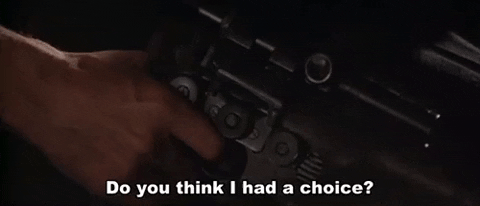Friday 22 November 2019
Thou Art
Wednesday 20 November 2019
Nothing is Real if You Don't Believe in Who You Are
BLAME
the human tendency to
Find someone to BLAME.
then I’ll ask you to read one
Genesis 1:
which I commanded you that you should not eat?’
She gave me of The Tree and I ate.’
And The Woman said,
Why must we go hungry?’
‘But we don’t know anything about this fruit.’
Then Man and His Wife took some of the fruit and ate it.
Unumbotte came down from the sky and asked,
‘Who ate the fruit?’
They answered,
‘We did.’
Unumbotte asked,
‘Who told you that you could eat that fruit?’
They replied,
‘Snake did.’
It’s the same story.
Poor Snake.
It’s the same story.
What do you make of this,
Yeah, but it turns out to be Snake.
And Snake in both of these stories is :
Why?
The Power of Life,
just as The Moon sheds its Shadow.
The Snake in most cultures is POSITIVE.
Even the most poisonous thing, in India, the cobra, is a sacred animal.
And The Serpent, Naga, The Serpent King,
Thursday 14 November 2019
Who Shot First?

Question: is there an objective ‘Reality’ or a series of interdependent mental projections?
In other words, was Hitler a kind of nationally conjured totem to re-energize castrated and enraged Germany?
Were The Beatles a quadrant of awakening shamans that carried a generation from plodding rock, to sexy pop, then psychedelia and ultimately consumerism?
The events in the outer world are governed by subtler energies, many of which pass through our collective psyche.
No doubt meteors and hurricanes shape environment but culture, by definition, is the manifestation of human drives.
There are patterns, shapes and archetypes that recur.
JOSEPH CAMPBELL:
Well, a serendipitous adventure can take place, also, You know, what the word serendipity comes from?
Comes from the Sanskrit Swarandwipa, the Isle of Silk, which was formerly the name of Ceylon
And it’s a story about a family that’s just rambling on it’s way to Ceylon, and all these adventures take place.
And so you can have the serendipitous adventure as well.
BILL MOYERS:
Is the adventurer who takes that kind of trip a hero in the mythological sense?
JOSEPH CAMPBELL:
Yes, He is ready for it.
This is a very interesting thing about these mythological themes.
The achievement of the hero is one that he is ready for, and it’s really a manifestation of his character.
And it’s amusing, the way in which the landscape and the conditions of the environment match the readiness of the hero.
The adventure that he’s ready for is the one that he gets.
(Clip from “Star Wars”)
HAN SOLO:
Look, I ain’t in this for your revolution and I’m not in it for you, Princess.
I expect to be well paid.
I’m in it for me.
BILL MOYERS:
The mercenary, Solo, begins as a mercenary and ends up as a hero.
JOSEPH CAMPBELL:
He was a very practical guy, a materialist in his character, at least as he thought of himself.
But he was a compassionate human being at the same time, and didn’t know it.
The adventure evoked a quality of his character that he hadn’t known he possessed.
(Clip from “Star Wars”)
PRINCESS LElA:
I love you.
HAN SOLO:
I know.
JOSEPH CAMPBELL:
He thinks he’s an egoist, he really isn’t,
and that’s a very lovable kind of human being, I think, and there are lots of them functioning beautifully in the world.
They think they’re working for themselves, very practical and all, but no, there’s something else pushing them.
BILL MOYERS:
What did you think about the scene in the bar?
JOSEPH CAMPBELL:
That’s my favorite, not only in this piece, but of many, many pieces I’ve ever seen.
BILL MOYERS:
Why?
JOSEPH CAMPBELL:
Well, where you are is on the edge, you’re about to embark into the outlying spaces. And–
BILL MOYERS:
The real adventure.
JOSEPH CAMPBELL:
The real adventure.
This is the jumping-off place, and there is where you meet people who’ve been out there, and they run the machines that go out there, and you haven’t been there.
It reminds me a little bit in Robert Louis Stevenson’s Treasure Island, the atmosphere before you start off the adventure.
You’re in the seaport, and there’s old salts, seamen who’ve been on the sea, and that’s their world, and these are the space people, also.
Tuesday 12 November 2019
It Will Hurt More Than You've Ever Been Hurt — And You Will Have a Scar
Tuesday 5 November 2019
Wolf-Kin
2 :
6 :
2 :
2 :
2 :
2 :
6 :
OLIVER :
Pens.
Poetry.
Socks.
The Astral Plane was like a magnet for lost dreams.
That was the other thing we found.
In The Real World, when people lost their minds, they ended up here.
And who are we, then?
Hmm.
What you got today?
OLIVER :
Look at that.
[SNIFFS.]
Can I have him?
OLIVER :
It's a her, I think, and no.
If you want a baby, you can scavenge one yourself.
THE WOLF :
"Scavenge." That's – I'm a wolf.
Wolves don't scavenge.
We hunt.
You're lucky I don't hunt you.
OLIVER :
Well, you live just next door.
Wouldn't be hard.
THE WOLF :
Have you told her about the Holocaust yet?
OLIVER :
The? What?
Prepare her, Oliver.
You can't grow up too fast.
That's my motto.
Also, herpes.
Make sure you tell her about herpes, like, right away.
MELANIE :
[SIGHS.]
Get away! Go on!
Shoo! Get away! Get away!
THE WOLF :
[HOWLS.]
OLIVER :
Wife.
MELANIE:
Husband.
What did we scavenge today?
OLIVER :
Well, half a sandwich, a very nice sock and, uh, this baby.
MELANIE:
Oh, baby.
Well, look at that.
[GASPS.]
Oh.
Oh, aren't you adorable.
Let's get you inside.
[BABY COOING.]
[THE WOLF HOWLING.]
[HOWLING CONTINUES.]
[SIREN WAILING.]
MELANIE:
Mm.
What should we call her?
OLIVER :
The soup?
MELANIE:
OLIVER :
Oh, her name is Sydney.
MELANIE:
How do you know?
OLIVER :
She told me.
MELANIE:
What else did she say?
OLIVER :
Well, nothing.
She's a baby.
MELANIE:
She looks familiar somehow.
Syd.
Sydney.
It's okay.
Everything's okay.
[THE WOLF HOWLING.]
MELANIE:
Don't.
OLIVER :
I won't.
Although, he did blow the paper house down last time.
This house is straw, though, Mighty Straw.
It should hold.
[WIND WHISTLING.]
- [WIND HOWLING LOUDLY.]
[HOUSE CREAKING, RUMBLING.]
I'll just go and chat with him, shall I?
THE WOLF :
Oh, hey.
[CHUCKLES.]
I was just, uh [EXHALES.]
This is Cynthia.
I found her wandering alone in the woods.
She's lost her innocence, which is a win for this guy.
Plus, hey, she brought all these dirty needles with her, so I was thinking, party? Huh?
Is that Soup?
MELANIE:
[GROWLS.]
Hello, Melanie.
CYNTHIA:
Hi.
She's given up all Hope.
[CHUCKLES.]
Isn't that great?
OLIVER :
Look, we're trying to have a nice life here and raise this baby with Wonder and Magic, so we need to keep The Real World out.
You guys like magic?
'Cause I can do magic.
[CHUCKLES.]
It was in my sleeve.
OLIVER :
Go away.
[GROWLING.]
MELANIE:
Not you, hon.
Come in.
Have some soup.
Sorry.
[ROARING.]
OLIVER :
Listen, don't be mad.
[SIGHS.]
We should move.
[THE WOLF HOWLING IN DISTANCE.]
[INDISTINCT WHISPERING.]
[INSECTS TRILLING.]
OLIVER :
There we go.
That's perfect.
Oh, yes, that's perfect for [CONTINUES INDISTINCTLY.]
SYD :
Why does some music make you happy but other music make you sad?
OLIVER :
Well, uh, do you know the difference between a major and a minor chord?
SYD :
OLIVER :
No excuse.
I'll show you when we get home.
SYD :
Why do people use umbrellas in the rain but not the snow?
OLIVER:
SYD :
Whose stuff is this?
OLIVER :
[SIGHS.]
When they forget about something, when it stops being important, it comes here.
SYD :
Oh.
OLIVER :
Oh.
SYD :
I'm gonna call her Heady.
OLIVER :
Little bird.
Not that way.
SYD :
Why not?
[MACHINERY WHIRRING.]
What is it?
OLIVER :
It-it's called The Ostrich.
Oh, wait, that's not right.
It's the big bird, isn't it? No, The City.
It's called The City.
Also known as The Real World.
SYD :
What makes it Real?
OLIVER :
I'll explain when you're older.
SYD :
No, now.
OLIVER :
That's not the way it works, little bird.
I'm The Daddy, and you're The Baby, and I'll tell you about The Real World when you're older.
Now, come on.
Mommy's making stuffed animal pie.
Mmm.
We don't want to be late.
SYD :
[FLIES BUZZING.]
People think Death is scary.
It's pretty scary, huh? I mean, look at it.
All oozy, and what are those, maggots?
SYD :
That's just Nature.
Mm, kids die, too, you know.
Everybody.
Your parents.
Ooh.
That's got to be scary, knowing that, huh? Mm.
SYD :
My mom told me that Death is just part of Life.
[GROANS.]
She did, huh?
OLIVER:
SYD :
Got to go.
Bye.
Wait, wait, wait.
Did she tell you about chlamydia?
MELANIE:
Once upon a time,
There was a girl who had the most extraordinary ability.
She could feel everything the animals felt.
When a donkey stubbed its toe, her toe hurt.
Every time a monkey got sad, she got sad.
It was her special power.
And she called her special power "Empathy."
They did everything together.
But it's a hard thing for a little girl to share the feelings of others.
And she started to wonder,
No.
No.
[DISTANT HOWLING.]
[GASPS.]
Cynthia.
Hey.
Do you ever miss your parents?
Back in The Real World.
Wasn't your mom a lush? I love that word.
"Lush."
Which, uh Remember how she used to tuck you in at night with flecks of vomit in her hair?
He wants you to come home real bad.
He love-love-loves you.
I have to go inside.
Hey.
- [GASPS.]
Look what I found.
Hmm? [CHUCKLES.]
I don't do that anymore.
Aw come on.
Sure, you do.
Don't be scared, gorgeous.
You think the light bulb is afraid of the dark?
'Cause in the dark it can shine.
- [SIGHS SOFTLY.]
- Shine for me, baby.
[BIRDS CHIRPING.]
MELANIE:
And in a couple years, your body will start to change to be more like Mommy's.
It's the most natural thing in the world.
Any questions?
SYD :
MELANIE:
SYD :
From The Wolf.
MELANIE:
Uh, well um, you know how, when someone sneezes on you, you catch a cold?
And chlamydia is kind of like a cold, except for your vagina.
And, uh, you get it by having unprotected sex with someone who has that virus.
Does that make sense?
SYD :
- [MELANIE CHUCKLES.]

